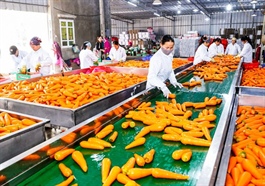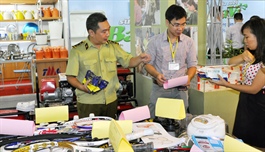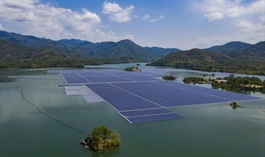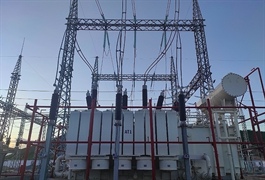Turning an eagle eye on Vietnam's attraction for the 'eagles'
Turning an eagle eye on Vietnam's attraction for the 'eagles'
I am not an expert. Most certainly, I am not an economist. I just speak from the experience of being an ordinary, unskilled worker.
Until a few years ago, as college students, my friend and I typically spent summer vacations as factory workers to earn some money and help parents pay our tuition fees.Honestly, those three months felt like three centuries.
I used to work in a Chinese company's toy factory located in an industrial park. My job was to clean the toys by using a small piece of alcohol-soaked cloth to wipe away spilt paint. Having to sit all day in the factory in intense summer heat, the loud noises of engines, the shouts of team managers and the smell of paint and plastic was a tiring experience – physically and mentally exhausting.
There were so many times I wanted to quit. But I would reason with myself: "Hasn't mother been working here for years? I am a worker, so who am I to demand anything? I can only accept this." Each time I thought I would take advantage of the toilet break to get some rest, I would turn back from the lavatory doors without entering because the stench was terrible.
For lunch, everyone was given coupons to exchange for food at the cafeteria, but most people brought lunch with them from home. The food prepared by the company for workers was difficult to swallow. The rice was dry and hard, the fish looked like fish but didn't taste like fish, and the broth was just salty water with a few stalks of vegetables.
Every once in a while, I was also assigned to clean out the trash. The work was tough, but I endured it for the monthly wage of VND3.5 million ($150.95), which was a rather large sum for me then.
Eventually, I managed to endure several summers in that factory, mainly by thinking about my mother. She has been a worker there for over eight years now. She has gone through almost all departments and production stages - assembling, painting, sewing, operating the plastic injection molding machine and so on. The painting department is the most toxic of them all.
You must be wondering why we didn't speak up about the terrible working conditions. My mother explained that if we speak up, the problem would still not be resolved and we would have left a bad impression on the managers. This would have meant, in the best case scenario, subtle harassment by being transferred all over the place. It is better to just keep quiet and keep working for the monthly pay-check, she said.
I'm not saying that all factories that employ unskilled workers in Vietnam, run by domestic or FDI firms, have the same conditions as the one my mother works at. There are companies that care much more about the environment and workers' health, for sure. However, bad working conditions and lousy treatment of workers is not an exception.
Just recently, there have been media reports of workers getting food poisoning, fainting, not getting paid, having their wages cut or being fired against regulations.
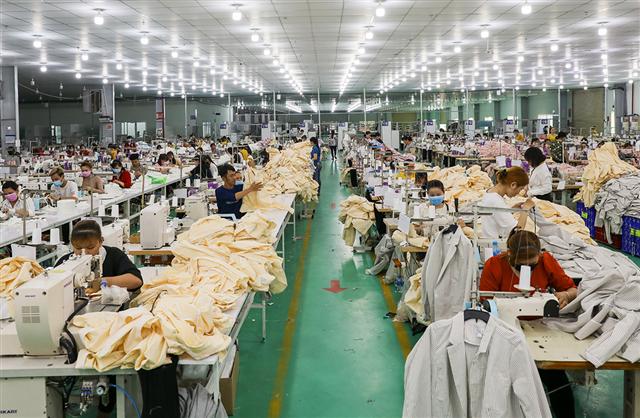
Garment workers at a factory in the southern Long An Province, February 2020. Photo by VnExpress/Quynh Tran.
|
The Vietnam General Confederation of Labor has reported that each year, 500-700 die in working place accidents. Worse still, a representative of the agency has also admitted that the number of occupational accidents could be many times higher in reality.
In 2019, the southern province of Binh Duong, home to a large number of industrial parks, recorded 845 accidents. In 37 cases, 41 people died and in 113 cases, the injury rate ranged from 31 to 96 percent.
After some major working place accident, experts and others would weigh in on unsafe environments, the need to improve compliance with safety regulations and so on. However, no real attention is paid to daily working conditions. There is hardly any mention of this. I know from personal experience that this problem is not considered as people discuss the number of deaths, injuries, food poisoning cases and so on. That it is mostly ignored does not mean that it does not exist.
With little or no drama, the working conditions quietly chip away at the workers' health – little by little – each day.
Opportunity for whom, for what?
These days, there is excitement about Vietnam’s post-Covid-19 opportunities. I see industry leaders or local managers enthusiastically calling for the nation to quickly "prepare the nests for the eagles" to welcome the wave of businesses shifting from other places and investing to manufacture and produce in Vietnam.
Vietnam's success in containing Covid-19 has become a promotional tool for the country in attracting investment. The risk of a global supply chain disruption has accelerated the shifting of production facilities by multinational companies.
Jacques Morisset, the World Bank Lead Economist and Program Leader for Vietnam, says that "Covid-19 has created a special opportunity for Vietnam." Specifically, industrial production and the processing and manufacturing sectors are thriving again in the "new normal."
Surveys of businesses in the processing and manufacturing industries show that the FDI sector is the most optimistic, with 82.8 percent of the respondents predicting that their business and production situation would improve by the end of the year.
I understand this enthusiasm, but it also makes me uneasy – not because of any Covid-19 implication or some other unpredictable variable, but because, regardless of the situation, normal or the new normal, we still don't have a better environment for all workers in the country, especially the "unskilled" segment.
Among those who are excited about the prospect of a wave of factories moving to Vietnam, how many care about the living and working environment of Vietnamese workers? I hope that all those excitedly preparing to attract foreign investment try, just one time, to visit workers and ask them what they want from this race to "attract the eagles."
My mother still works at that toy factory. Every working day, she takes two bottles of water with her. When I asked her why, she said: "They locked the taps so I am taking these along for when I get thirsty." It hurts me to hear this. I have asked her to quit, many times, but she refuses. "I'm a worker, who am I to make demands," is her refrain.
Mother’s response has forced a realization or two on me. First, I cannot force my way of thinking on her. And despite that, everyone has her/his right to work, to be recognized for their worth in their family and the community, to have control over their own lives. In this measurement of worth, workers have the same value as engineers, directors or civil servants. Fundamentally, for an export-oriented economy like Vietnam, they are a huge part of attracting foreign investment, and a huge part of sustaining it.
Second, many workers like my mother and her friends at the factory are used to being on the weak side, and it is this, their acceptance of this fact, that they have very little bargaining power, that keeps the "system" going, while economists and other experts hold forth on the importance of "competitive labor market" and express concern about "rising labor costs."
As I said at the beginning, I am not an expert.
So I have a question. As long as such factories like the one that my mother works for exist, can we still be proud of our labor market, or as some call it, Vietnam's "national competitive advantage?"
*Le Thi Ly is a teacher. The opinions expressed are her own.










